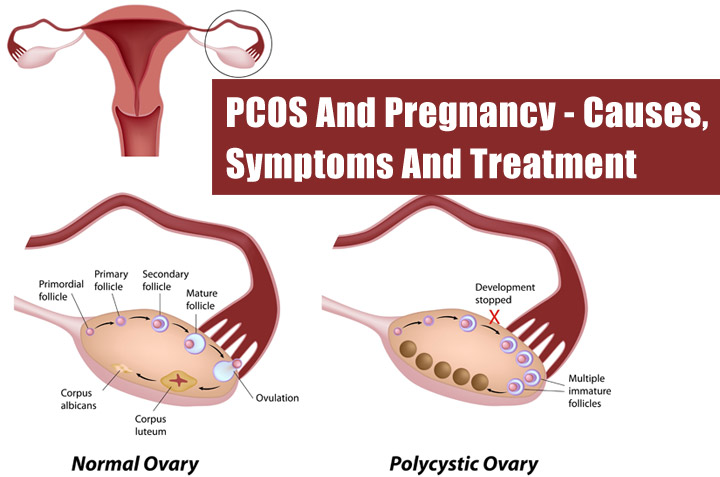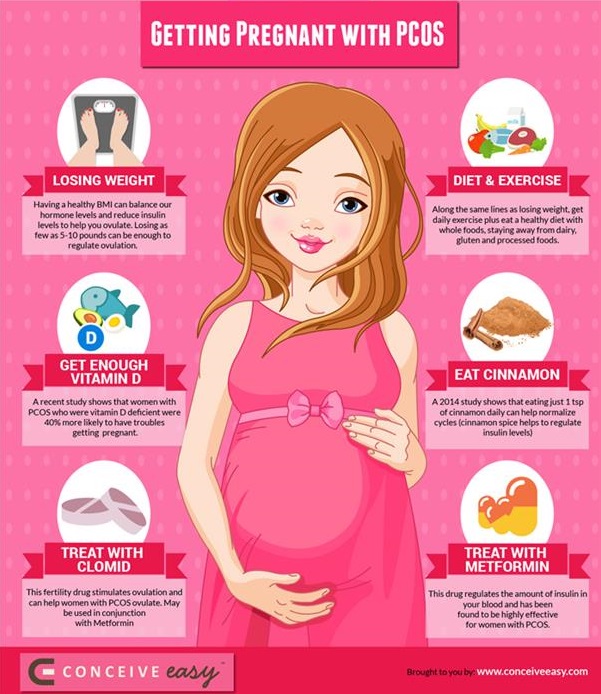PCOS And Pregnancy

Contents:
Pregnancy With PCOS
Polycystic Ovary Syndrome (PCOS) is a pathological change in the structure and function of the ovaries, which provoke a hormonal, or in other words, endocrinal disruptions in the woman's body. The hormonal disruption leads to thickening of the ovary’s wall, ovulation fails, as the egg cannot overcome this obstacle and remains in the ovary. "Stuck" follicle is filled with fluid and converted into a cyst. This happens with each follicle, released in the menstrual cycle, so over time, the ovaries are literally "woven" from many small cysts.
You may wonder why endocrinal disruption has such consequences. What is the relation between hormones and ovaries? It is obvious: the first hormonal changes occur in our puberty making it possible for us to have children. Therefore, a healthy endocrine system is a guarantee of reproductive health.
Hormonal disorders and PCOS can cause pathological changes in the maturation of eggs and ovulation disorders. PCOS is one of the most common causes of the female infertility. However, it is reversible, the polycystic ovaries can be treated, and it doesn’t prevent from having children. Pregnancy with PCOS is possible if you undergo adequate treatment and consult not only gynecologists and endocrinologists, but also fertility specialists, if necessary. Let's talk about this disease in details to understand what "enemy" we should combat. As forewarned is forearmed.
Disease History
Modern gynecology and endocrinology associate cystic ovaries syndrome with pathological changes in the woman hormonal system. Specialists distinguish a genetic component, i. e. we inherit it in the female line, PCOS can be triggered by diabetes and overweight. Polycystic ovaries is a multifaceted disease.
However, scientists are confident that PCOS is provoked by the excessive levels of male (androgen) hormones in women. Androgens affect the genesis of oocytes — development of female gametes as well as thicken the outer layer of the ovaries, resulting in the ovulation disorders. Therefore, the ovulation in PCOS is quite rare. Even if the egg matures and turns into a follicle ready to fertilization, it cannot overcome the obstacle of the deformed ovary’s walls. The further fertilization doesn’t occur as the sperm and the ovum never meet. In this case, it is impossible to become pregnant. Therefore, when planning pregnancy it is necessary to exclude PCOS. Let’s see how.
Alarming Symptoms

The first thing to track carefully is the menstrual cycle. Irregular cycle, frequent and lengthy delays, painful menstruation is a sign that your body is undergoing pathological changes.
PCOS symptoms: excess body and face hair, oily skin and hair, acne. These are the symptoms of hormonal disorders in women. The hormonal disorders, in their turn, can lead to PCOS.
You should pay attention to the excess weight: certainly, it could be a temporary phenomenon, if you have eaten plenty of delicious things and forgotten about physical exercise. However, the constant excess weight may be a risk factor for the development of a variety of diseases. Obesity can lead to the endocrine system’s pathologies and cause serious hormonal disruptions. Therefore, if you see in yourself at least one of the alarming symptoms, and have previously neglected regular visits to the gynecologist and endocrinologist, it is time to seek medical advice.
Diagnosis of PCOS
Adequate diagnosis of ovarian cystic traditionally involves several steps: examination by a gynecologist-endocrinologist, ultrasonic investigation of small pelvis organs, blood plasma hormones testing (LH, FSH, prolactin, free testosterone, DHEA, progesterone), biochemical blood test (PCOS can cause elevated levels of cholesterol, triglycerides and glucose), oral glucose tolerance test to determine insulin sensitivity, in some cases, diagnostic laparoscopy, too.
Using tests’ results, the doctors may diagnose the polycystic ovary syndrome, and depending on its causes prescribe you an effective treatment. If you plan a pregnancy with PCOS as the main factor of infertility, the specialist will answer whether it is possible to get pregnant with PCOS and will recommend how to get pregnant with this syndrome.
PCOS and Pregnancy
Getting pregnant with PCOS fails, because the woman has no ovulation. Some will say that it’s enough to restore ovulation and everything will be OK. But the things are not so simple, as we know that all the systems in our body are interconnected, and for best results, we need combined solutions.
- The first thing that the experts consider important is to loose weigh. Many women neglect this recommendation, but weight normalization is an important step in the treatment of PCOS.
- The second stage is general hormonal therapy. It’s necessary to eliminate the main cause of the disease, the hormonal malfunction in the body.
- The third stage is the stimulation of ovulation. Note that the stimulation of ovulation with PCOS is necessary for women planning to get pregnant as soon as possible. Stimulation of ovulation with PCOS is conducted after tubal infertility in women and male infertility factors are excluded.
If conservative treatment doesn't help doctors may recommend a laparoscopic surgery, a partial or complete ovarian resection. The method of surgery depends on whether a woman plans to have children.
It’s possible to get pregnant after a laparoscopy as well as after any other surgery. The question is how to achieve it. If treatment is not successful, or you have decided to remove the ovaries completely, there are still chances to become a mother with the help of assisted reproductive technologies (ART). In vitro fertilization (IVF) with donor egg, if PCOS made it impossible for the specialists to keep your own eggs. There is always a way out and you should remember it, no matter what diagnosis you have.